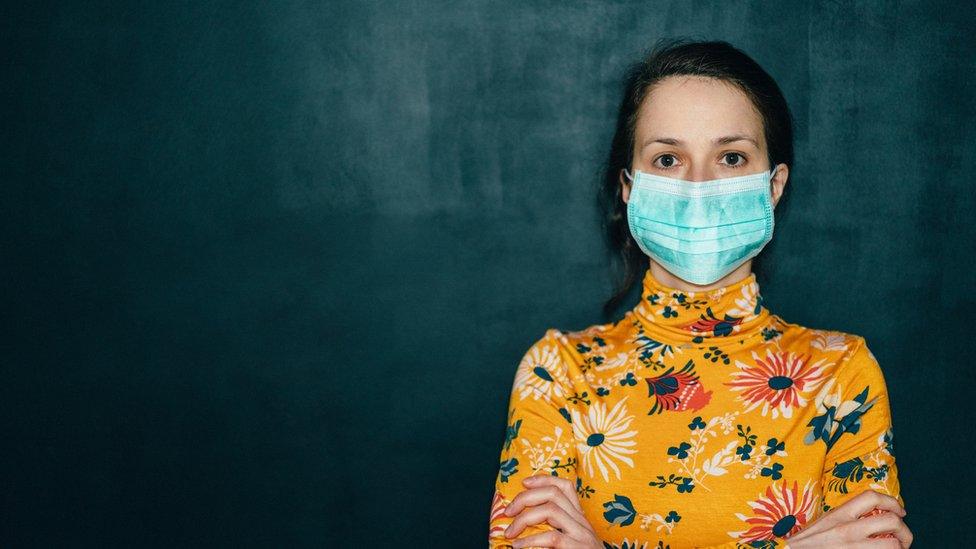Lockdown: Secondary school pupils could go back after Easter
- Published
- comments
Reopening education remains 'top priority' says education minister
Secondary school pupils could all be back in school after the Easter break, the Welsh Government says.
Education Minister Kirsty Williams said it was "her preference" older pupils return after the holidays, which end on 12 April.
The news comes as three-to-seven year olds return to classrooms in Wales in a phased return to face-to-face teaching.
Other primary pupils, and years 11 and 13, are due to return on 15 March if Covid case rates continue to fall.
However, on Anglesey, the return has been delayed until 1 March, with the infection rate on the island the highest in Wales - 112.8 cases per 100,000 people, compared to a national average of 80 per 100,000.
In England, all schools are expected to reopen from 8 March, but a more phased approach is planned in Wales.
Ms Williams told a press conference her plans for schools were "consistent with UK-wide advice".
The Welsh Conservatives said many parents would be "frustrated" and questioned why some other sectors, such as non-essential retail, were earmarked for opening before all pupils go back.
Plaid Cymru backed the phased return, but the NAHT union said suggestions of an Easter return were "premature".
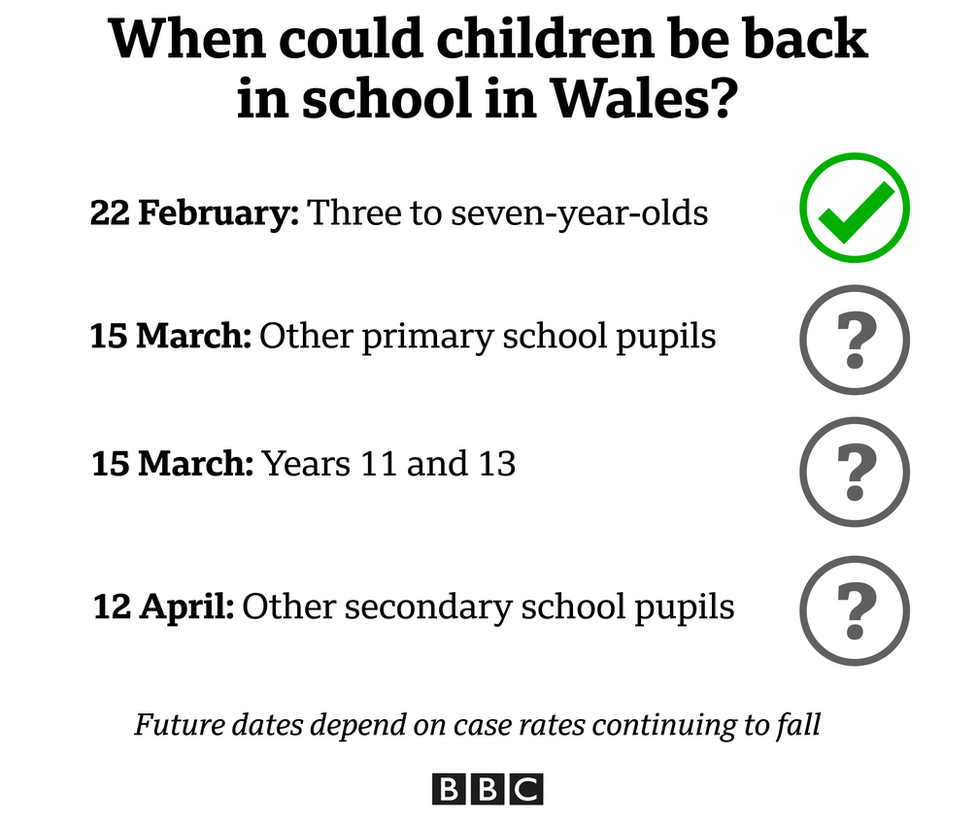
Ms Williams had said on Sunday she hoped more pupils would return if cases continued falling.
Meanwhile, pupils in years 11 and 13, and those in further education settings, will be tested twice a week, alongside education staff.
The Covid case rate in Wales is currently 80 per 100,000 people - the lowest of the UK nations - and Wales' R number is between 0.7 and 0.9, Public Health Wales estimates.
Are you a parent or teacher? How do you feel about children returning to school? Email haveyoursay@bbc.co.uk, external.
Under current proposals non-essential Welsh retailers may begin reopening from 15 March, which is before the bulk of secondary school pupils return.
Asked about this, Ms Williams said the Welsh Government would "balance needs" for the entire population when lifting restrictions.
The government would "use what available headroom we have to prioritise children and young people - that will not change", she said.
But, there "may be other headroom that allows us to do other things".
A decision on when older pupils can return will be taken before the Easter holidays.
Students in years with exams may return from 15 March, but Ms Williams said it would not "necessarily be a return to full time on-site learning".
"That potentially is looking at rotas, cutting class sizes, different types of timetabling so that children can get the face to face contact that they need, but looks to minimise the impact of opening up on the overall public health situation," the minister added.
How do primary pupils' parents feel?
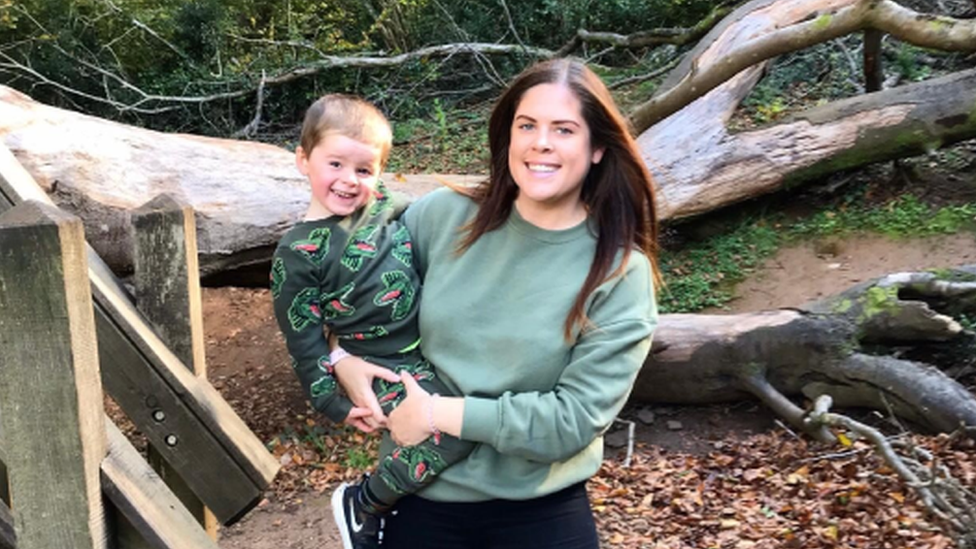
Lisa Freeman said not being in school had "very much affected" her four-year-old son Ethan
Lisa Freeman's four-year-old son Ethan was returning to his reception class at Ysgol Hamadryad in Cardiff.
She said he was "very nervous" and he did not really talk about going back to school, so they had "broached the subject slowly".
"He's struggled with the online lessons," Ms Freeman said.
"I think, as a four-year-old, being sat behind a computer screen has been very difficult for him. He just didn't engage as much as we would have like him to."
Covid: Schools return with pupils 'excited to see friends'
Ms Freeman said she was concerned there would be further school closures as it had "very much affected him".
"Hopefully this is the last time - I think it would be really harmful to pull him out of school again," she said.
"He hasn't left my side since the beginning of December really. I think it's quite frightening, we try to keep the news off as much as possible [around him].
"Just to be around his peers I think is huge for his age group."
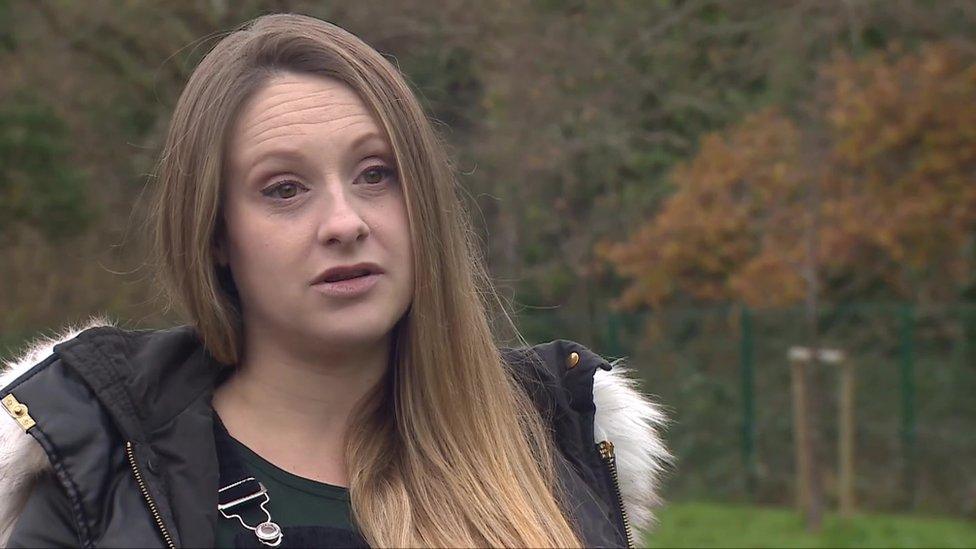
Victoria Rosser said she was a "little anxious" about her son's return to school on Thursday
Victoria Rosser, from Cwmbran, whose five-year-old son will return on Thursday, said she was not sure if it was the right time for children to return.
"I'm a little anxious as I'm a shielding parent who hasn't received the second vaccine, however, I feel more confident than I did in September," she said.
Ms Rosser, a former teacher, said her son was excited but also "a little nervous" to return to school.
"Even though he's in Year 1, he's only spent just over half a year in school," she said.
"Children of similar age, who haven't had the opportunity to learn at home, could have had changes made to their neuro pathways forever.
"So even though I'm scared to send my son back to school, I will, because we are yet to learn the damage it has done to them."
Parents 'frustrated'
Welsh Conservative Senedd leader Andrew RT Davies said many parents will be "frustrated" after hearing that some students will not return to school until after Easter.
The party's education spokeswoman Suzy Davie added the Welsh Government "can't really claim to have school students as its priority when it eases other restrictions before the return of all pupils to the classroom".
Plaid Cymru leader Adam Price repeated his call for teachers to be vaccinated.
But he added: "I think the Welsh approach, which is also the Scottish and the Northern Irish one, is the right one and that's taking it in a step by step cautious way rather than doing it all at once".
But Laura Doel, director of headteachers union NAHT Cymru, said ministers should guard against moving too quickly.
"Given that many schools are only reopening their doors to foundation phase this week, we need to be careful about giving parents and learners false hope," she said.
"Statements about a full return after Easter are premature and unhelpful at this stage."
Could parents be fined for not sending children back?
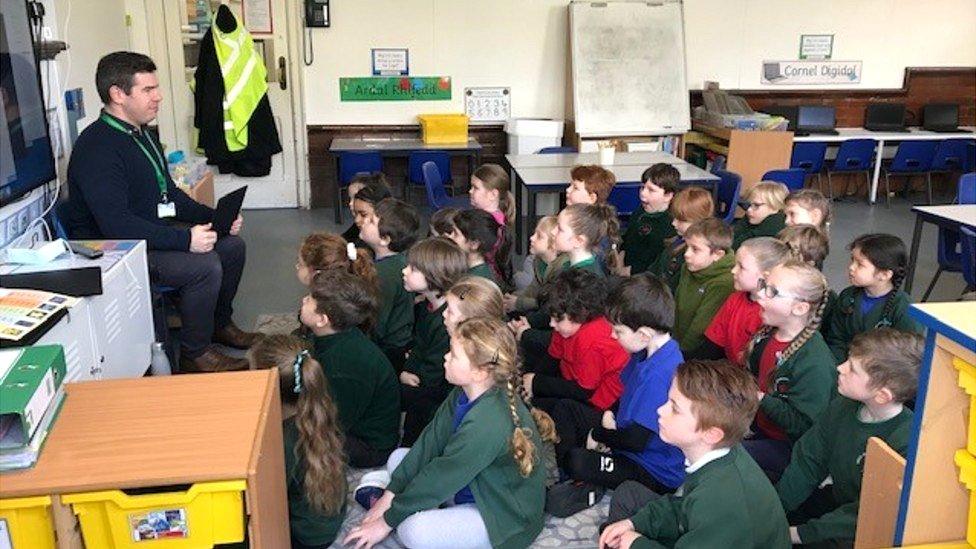
Ysgol Gymraeg Sant Baruc in Barry has Foundation phase children back in class
The Welsh Government said under the current circumstances punitive measures, including fines, would not be appropriate.
It said some authorities might deem it necessary to pursue "a small number of cases relating to persistent absence" which were unrelated to the pandemic and where there were concerns about the welfare of the child.
Teaching staff will now be tested twice weekly for Covid, and £5m will be spent on face coverings and other equipment.
What's the reaction among teachers?
Ty Golding - head teacher at Ysgol y Ddraig in Llantwit Major and Holton Primary School in Barry, Vale of Glamorgan - said his staff were "excited" at returning to school and "addressing those wellbeing and learning needs".
But he acknowledged some parents and staff still needed reassuring.
"The biggest challenge for us - which hopefully will be incident-free and quiet and all about settling back in - is winning hearts and minds in the community with parents and staff, making sure everyone feels safe and secure," he told BBC Radio Wales..
Asked whether he felt teachers and school staff should be prioritised for a Covid-19 vaccine, Mr Golding said he did, adding it was important they felt "a sense of prioritisation".
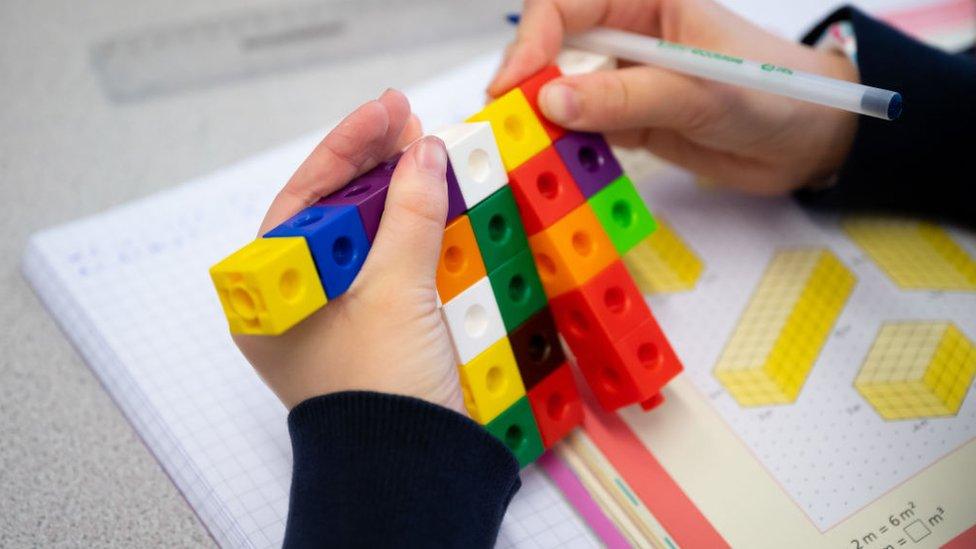
Primary schools in some parts of north Wales have said they will not have children back until later in the week, after concerns over higher case rate
Ministers said children aged three to seven had been prioritised to return to school first, due to evidence showing Covid spread less quickly among the youngest children, who can also be more difficult to teach remotely.
Will it be a phased return?
The Welsh Government had said it expected to see pupils returning from Monday but it would be "done in a phased and progressive way".
Primary schools in some parts of north Wales have said they would not have children back until later in the week, after concerns over higher case rates.
Wrexham, Anglesey, Denbighshire, Gwynedd and Flintshire are delaying the immediate return of younger pupils - with pupils back in class by Friday.
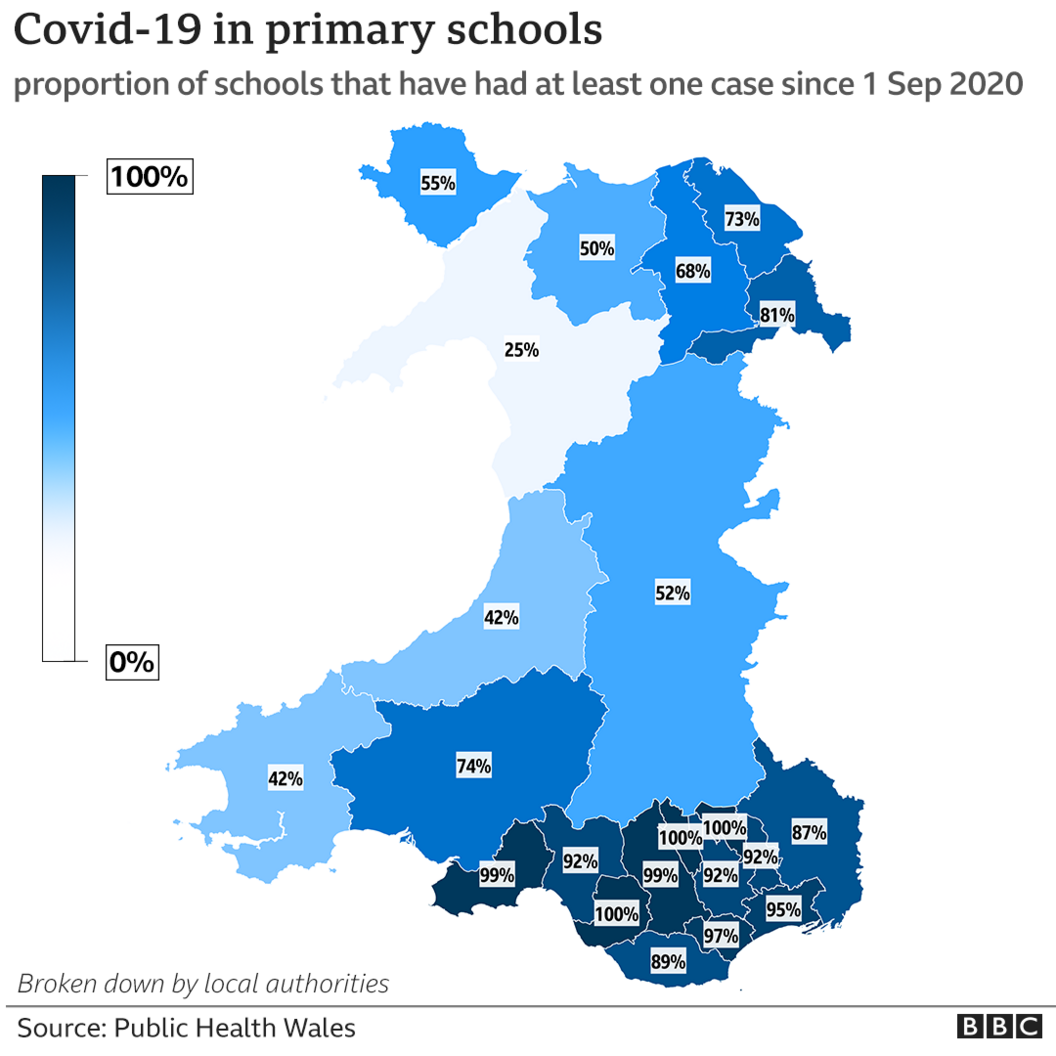
Ceredigion, the county in Wales with the lowest case rate, is also operating a phased return where children will attend for one day in the first week with a full return expected from 3 March.
Ms Williams said at the weekend the next Welsh Government review would look at whether older exam year pupils could return, alongside the remaining primary school year groups. That includes Years 11 and 13, and college students.

BITESIZE CYMRU WALES: Educational programmes in English and Welsh
LOCKDOWN LEARNING: How can BBC Bitesize help you learn from home?

'Cut numbers in classes'
In the same interview Ms Williams said: "Our priority will be to use whatever headroom we have to maximise face-to-face learning for Years 11 and 13, and many head teachers that we're consulting with would like some flexibility to get some Year 10 and Year 12 students in as well.
"But we might have to do that on a routine basis, allowing us to cut the number of children in the class down, helping to keep those schools as Covid-secure as possible."
Ms Williams also said some university students were due to return to campus this week for practical assessments.
She said the Welsh Government was working with universities "to bring back students when it's safe and appropriate to do".

- Published21 February 2021
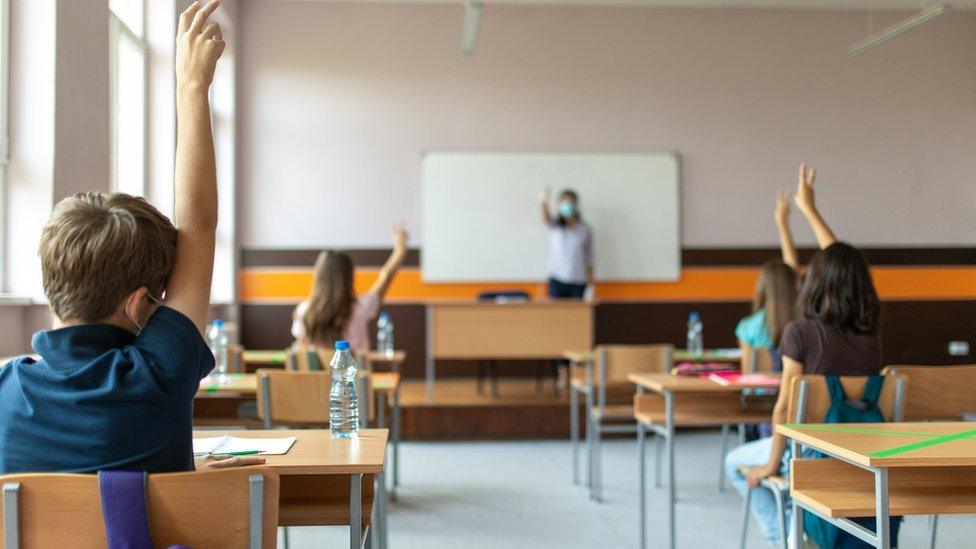
- Published19 February 2021
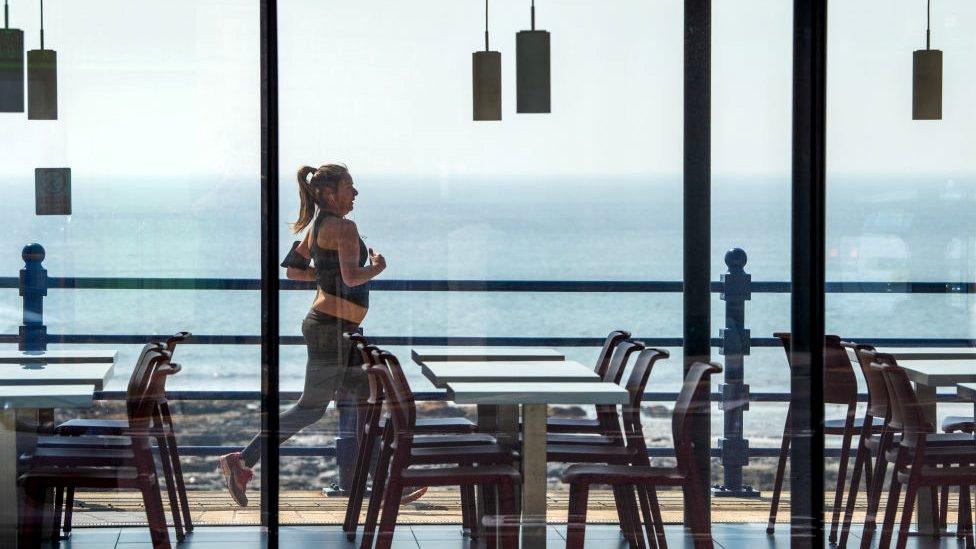
- Published18 February 2021
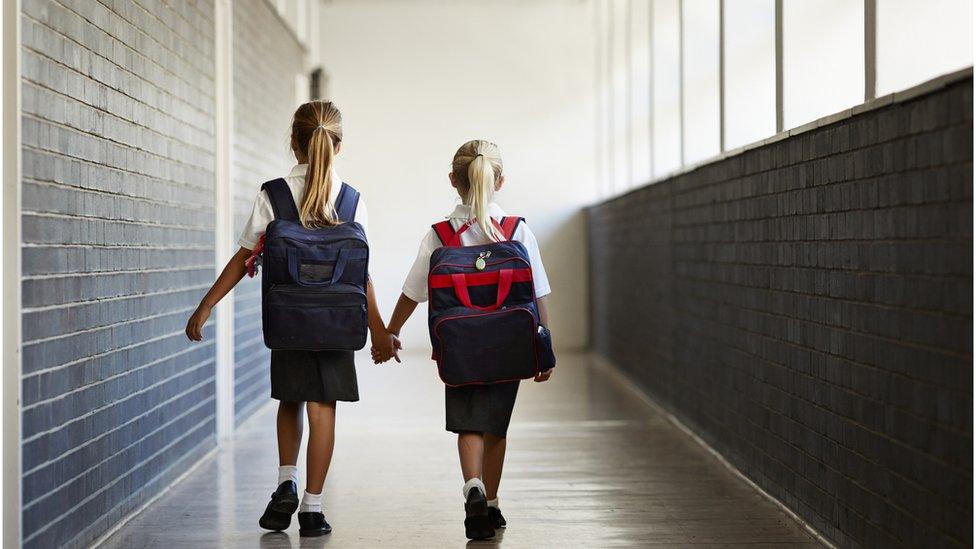
- Published11 February 2021
